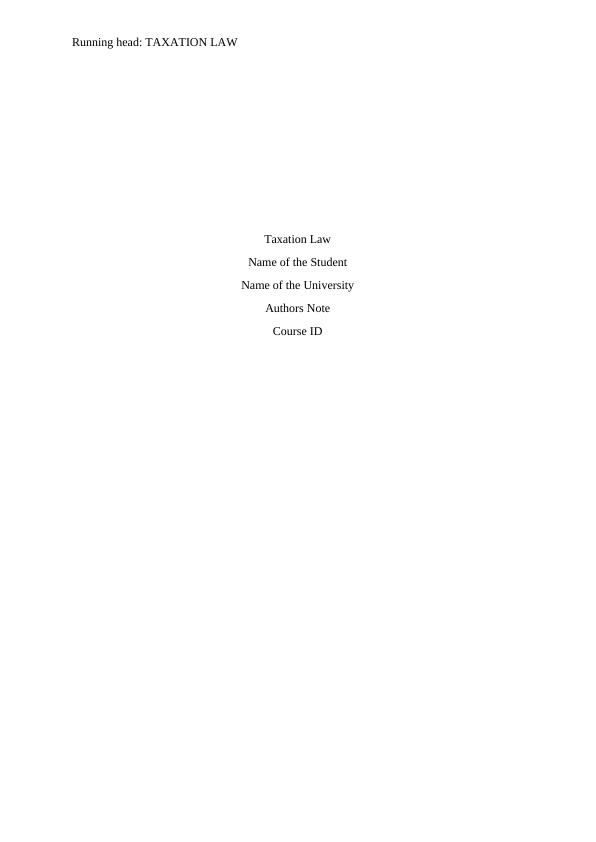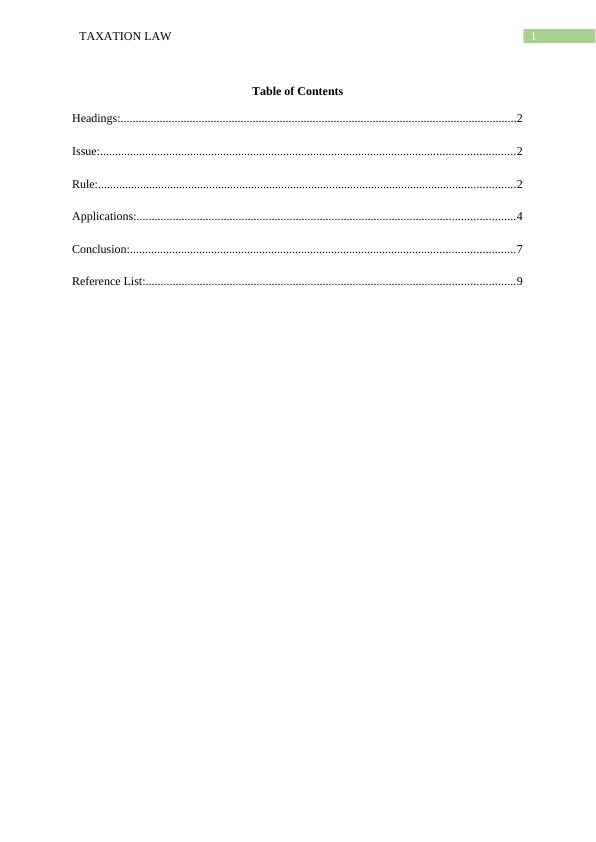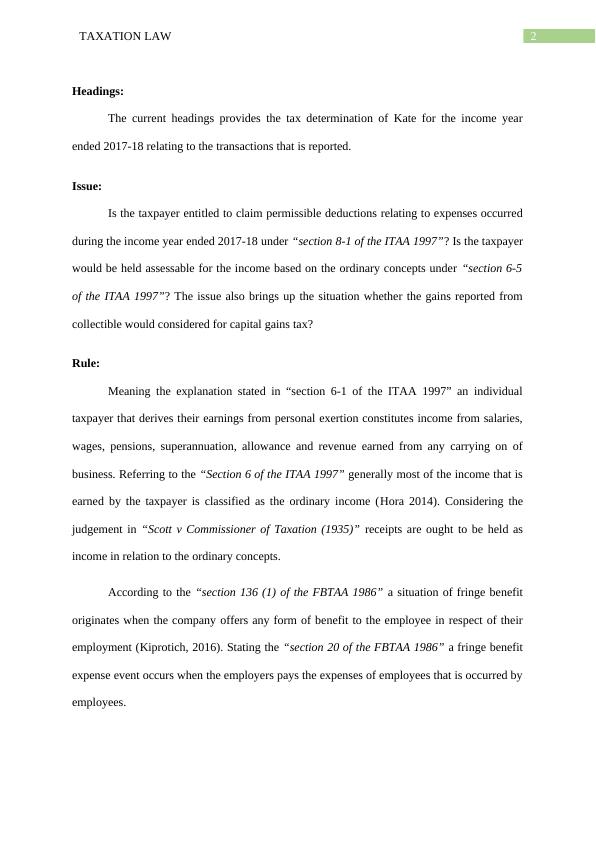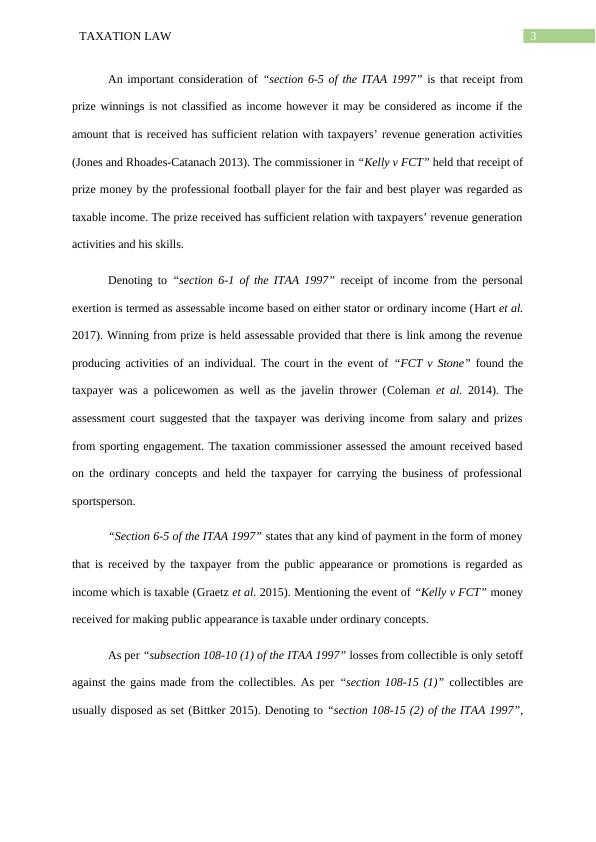Taxation Law: Tax Determination of Kate for Income Year 2017-18
Added on 2023-06-12
11 Pages2251 Words162 Views
Running head: TAXATION LAW
Taxation Law
Name of the Student
Name of the University
Authors Note
Course ID
Taxation Law
Name of the Student
Name of the University
Authors Note
Course ID

1TAXATION LAW
Table of Contents
Headings:....................................................................................................................................2
Issue:..........................................................................................................................................2
Rule:...........................................................................................................................................2
Applications:..............................................................................................................................4
Conclusion:................................................................................................................................7
Reference List:...........................................................................................................................9
Table of Contents
Headings:....................................................................................................................................2
Issue:..........................................................................................................................................2
Rule:...........................................................................................................................................2
Applications:..............................................................................................................................4
Conclusion:................................................................................................................................7
Reference List:...........................................................................................................................9

2TAXATION LAW
Headings:
The current headings provides the tax determination of Kate for the income year
ended 2017-18 relating to the transactions that is reported.
Issue:
Is the taxpayer entitled to claim permissible deductions relating to expenses occurred
during the income year ended 2017-18 under “section 8-1 of the ITAA 1997”? Is the taxpayer
would be held assessable for the income based on the ordinary concepts under “section 6-5
of the ITAA 1997”? The issue also brings up the situation whether the gains reported from
collectible would considered for capital gains tax?
Rule:
Meaning the explanation stated in “section 6-1 of the ITAA 1997” an individual
taxpayer that derives their earnings from personal exertion constitutes income from salaries,
wages, pensions, superannuation, allowance and revenue earned from any carrying on of
business. Referring to the “Section 6 of the ITAA 1997” generally most of the income that is
earned by the taxpayer is classified as the ordinary income (Hora 2014). Considering the
judgement in “Scott v Commissioner of Taxation (1935)” receipts are ought to be held as
income in relation to the ordinary concepts.
According to the “section 136 (1) of the FBTAA 1986” a situation of fringe benefit
originates when the company offers any form of benefit to the employee in respect of their
employment (Kiprotich, 2016). Stating the “section 20 of the FBTAA 1986” a fringe benefit
expense event occurs when the employers pays the expenses of employees that is occurred by
employees.
Headings:
The current headings provides the tax determination of Kate for the income year
ended 2017-18 relating to the transactions that is reported.
Issue:
Is the taxpayer entitled to claim permissible deductions relating to expenses occurred
during the income year ended 2017-18 under “section 8-1 of the ITAA 1997”? Is the taxpayer
would be held assessable for the income based on the ordinary concepts under “section 6-5
of the ITAA 1997”? The issue also brings up the situation whether the gains reported from
collectible would considered for capital gains tax?
Rule:
Meaning the explanation stated in “section 6-1 of the ITAA 1997” an individual
taxpayer that derives their earnings from personal exertion constitutes income from salaries,
wages, pensions, superannuation, allowance and revenue earned from any carrying on of
business. Referring to the “Section 6 of the ITAA 1997” generally most of the income that is
earned by the taxpayer is classified as the ordinary income (Hora 2014). Considering the
judgement in “Scott v Commissioner of Taxation (1935)” receipts are ought to be held as
income in relation to the ordinary concepts.
According to the “section 136 (1) of the FBTAA 1986” a situation of fringe benefit
originates when the company offers any form of benefit to the employee in respect of their
employment (Kiprotich, 2016). Stating the “section 20 of the FBTAA 1986” a fringe benefit
expense event occurs when the employers pays the expenses of employees that is occurred by
employees.

3TAXATION LAW
An important consideration of “section 6-5 of the ITAA 1997” is that receipt from
prize winnings is not classified as income however it may be considered as income if the
amount that is received has sufficient relation with taxpayers’ revenue generation activities
(Jones and Rhoades-Catanach 2013). The commissioner in “Kelly v FCT” held that receipt of
prize money by the professional football player for the fair and best player was regarded as
taxable income. The prize received has sufficient relation with taxpayers’ revenue generation
activities and his skills.
Denoting to “section 6-1 of the ITAA 1997” receipt of income from the personal
exertion is termed as assessable income based on either stator or ordinary income (Hart et al.
2017). Winning from prize is held assessable provided that there is link among the revenue
producing activities of an individual. The court in the event of “FCT v Stone” found the
taxpayer was a policewomen as well as the javelin thrower (Coleman et al. 2014). The
assessment court suggested that the taxpayer was deriving income from salary and prizes
from sporting engagement. The taxation commissioner assessed the amount received based
on the ordinary concepts and held the taxpayer for carrying the business of professional
sportsperson.
“Section 6-5 of the ITAA 1997” states that any kind of payment in the form of money
that is received by the taxpayer from the public appearance or promotions is regarded as
income which is taxable (Graetz et al. 2015). Mentioning the event of “Kelly v FCT” money
received for making public appearance is taxable under ordinary concepts.
As per “subsection 108-10 (1) of the ITAA 1997” losses from collectible is only setoff
against the gains made from the collectibles. As per “section 108-15 (1)” collectibles are
usually disposed as set (Bittker 2015). Denoting to “section 108-15 (2) of the ITAA 1997”,
An important consideration of “section 6-5 of the ITAA 1997” is that receipt from
prize winnings is not classified as income however it may be considered as income if the
amount that is received has sufficient relation with taxpayers’ revenue generation activities
(Jones and Rhoades-Catanach 2013). The commissioner in “Kelly v FCT” held that receipt of
prize money by the professional football player for the fair and best player was regarded as
taxable income. The prize received has sufficient relation with taxpayers’ revenue generation
activities and his skills.
Denoting to “section 6-1 of the ITAA 1997” receipt of income from the personal
exertion is termed as assessable income based on either stator or ordinary income (Hart et al.
2017). Winning from prize is held assessable provided that there is link among the revenue
producing activities of an individual. The court in the event of “FCT v Stone” found the
taxpayer was a policewomen as well as the javelin thrower (Coleman et al. 2014). The
assessment court suggested that the taxpayer was deriving income from salary and prizes
from sporting engagement. The taxation commissioner assessed the amount received based
on the ordinary concepts and held the taxpayer for carrying the business of professional
sportsperson.
“Section 6-5 of the ITAA 1997” states that any kind of payment in the form of money
that is received by the taxpayer from the public appearance or promotions is regarded as
income which is taxable (Graetz et al. 2015). Mentioning the event of “Kelly v FCT” money
received for making public appearance is taxable under ordinary concepts.
As per “subsection 108-10 (1) of the ITAA 1997” losses from collectible is only setoff
against the gains made from the collectibles. As per “section 108-15 (1)” collectibles are
usually disposed as set (Bittker 2015). Denoting to “section 108-15 (2) of the ITAA 1997”,

End of preview
Want to access all the pages? Upload your documents or become a member.
Related Documents
Taxation Law Application - PDFlg...
|11
|2169
|52
Determining Taxable Income and Allowable Deductions under Taxation Lawlg...
|12
|2334
|127
Taxation Law Application - Assignmentlg...
|10
|1592
|107
Taxation Lawlg...
|13
|3165
|53
Taxation Law: Understanding Tax Calculations and Deductions for Katelg...
|9
|1977
|303
Taxation Law: Income Tax Computation and Deductibility of Expenseslg...
|11
|2161
|202
